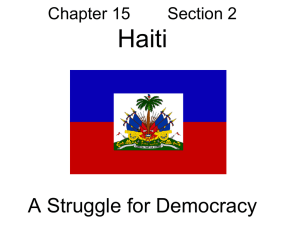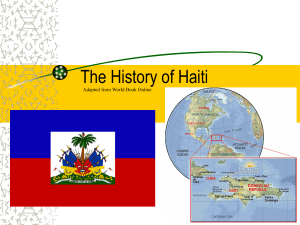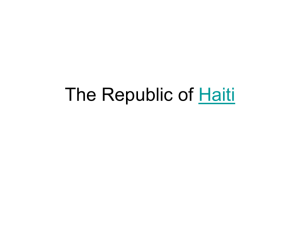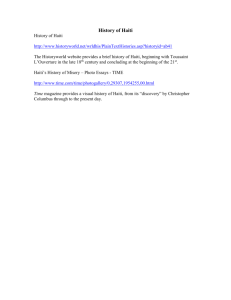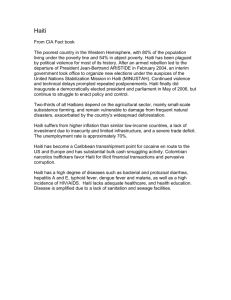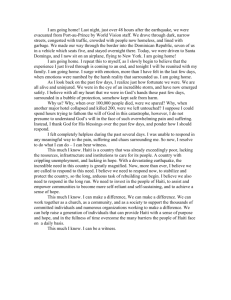Statement by Rep. Maxine Waters on the Overthrow of the Democratically-
advertisement
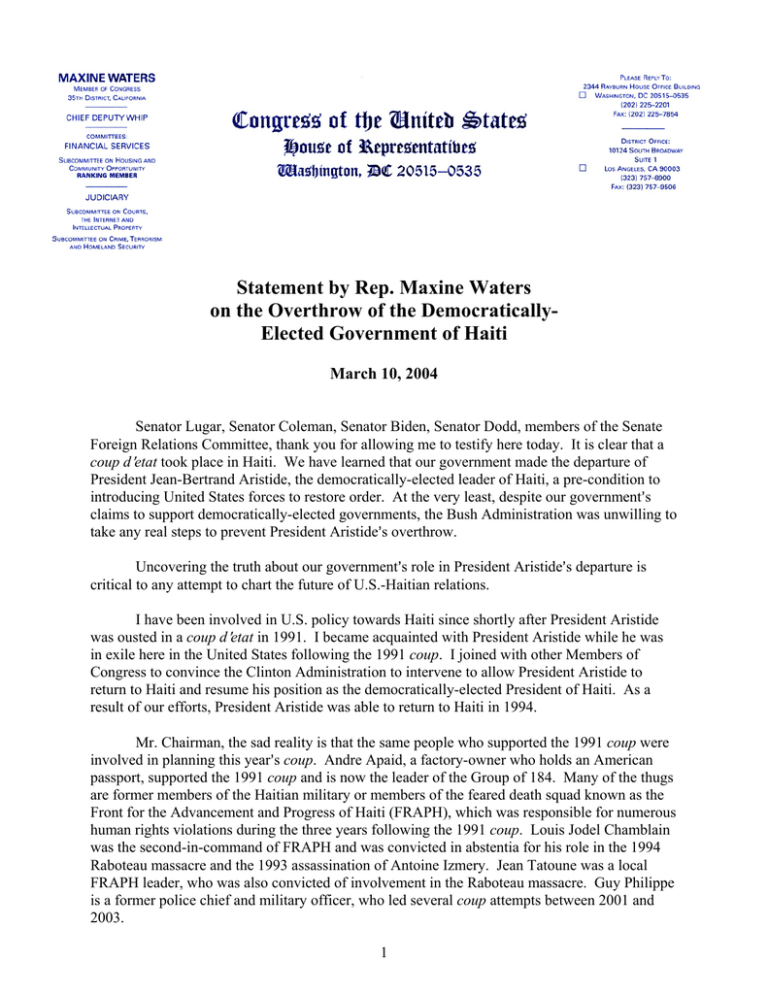
Statement by Rep. Maxine Waters on the Overthrow of the DemocraticallyElected Government of Haiti March 10, 2004 Senator Lugar, Senator Coleman, Senator Biden, Senator Dodd, members of the Senate Foreign Relations Committee, thank you for allowing me to testify here today. It is clear that a coup d=etat took place in Haiti. We have learned that our government made the departure of President Jean-Bertrand Aristide, the democratically-elected leader of Haiti, a pre-condition to introducing United States forces to restore order. At the very least, despite our government=s claims to support democratically-elected governments, the Bush Administration was unwilling to take any real steps to prevent President Aristide=s overthrow. Uncovering the truth about our government=s role in President Aristide=s departure is critical to any attempt to chart the future of U.S.-Haitian relations. I have been involved in U.S. policy towards Haiti since shortly after President Aristide was ousted in a coup d=etat in 1991. I became acquainted with President Aristide while he was in exile here in the United States following the 1991 coup. I joined with other Members of Congress to convince the Clinton Administration to intervene to allow President Aristide to return to Haiti and resume his position as the democratically-elected President of Haiti. As a result of our efforts, President Aristide was able to return to Haiti in 1994. Mr. Chairman, the sad reality is that the same people who supported the 1991 coup were involved in planning this year=s coup. Andre Apaid, a factory-owner who holds an American passport, supported the 1991 coup and is now the leader of the Group of 184. Many of the thugs are former members of the Haitian military or members of the feared death squad known as the Front for the Advancement and Progress of Haiti (FRAPH), which was responsible for numerous human rights violations during the three years following the 1991 coup. Louis Jodel Chamblain was the second-in-command of FRAPH and was convicted in abstentia for his role in the 1994 Raboteau massacre and the 1993 assassination of Antoine Izmery. Jean Tatoune was a local FRAPH leader, who was also convicted of involvement in the Raboteau massacre. Guy Philippe is a former police chief and military officer, who led several coup attempts between 2001 and 2003. 1 I am convinced that the recent coup involved not only Andre Apaid and the armed thugs but also our own Ambassador Roger Noriega. Ambassador Noriega=s history is replete with actions against Haiti, both as Senator Jesse Helms= chief of staff and now as the Bush Administration=s Assistant Secretary for Western Hemisphere Affairs. I have been to Haiti three times since the beginning of this year. While I was in Haiti, I met with President Aristide and Lavalas party members as well as Andre Apaid and other members of the Group of 184. I was also present when the international community and the members of CARICOM presented the CARICOM proposal to President Aristide. The CARICOM proposal was designed to limit President Aristide=s power and provide for the selection of a new prime minister, who would be acceptable to the opposition and able to exercise more independent power in Haiti. I believe the demonstrations organized by Andre Apaid and the Group of 184 were designed to provoke the Haitian police into retaliating against the demonstrators, who routinely threw rocks, spat in the face of police officers and defied government orders establishing permissible parade routes for protests. In the beginning, these tactics worked and the police responded. However, when President Aristide learned what was happening, he was able to control the police and prevent them from carrying out acts of retaliation. When the police stopped responding to provocations by the demonstrators, I believe the U.S. government and the French government became involved in exerting increasing pressure on President Aristide, by refusing to fully support the CARICOM proposal and covertly supporting the thugs, who were taking over cities and cutting off supplies of food and water. Meanwhile, the thugs became bolder and bolder, threatening to carry out a bloodbath if President Aristide did not leave Haiti. Yet neither Andre Apaid nor the U.S. government ever admitted they knew who these thugs were or denounced their invasion of Haiti. I repeatedly appealed to Secretary of State Colin Powell to assist the government of Haiti, yet the Bush Administration refused to provide any assistance whatsoever to stop the violence until after President Aristide=s departure. It is clear that President Aristide=s departure was a pre-condition to any U.S. efforts to stop the violence. President Aristide told me that he was forced to leave Haiti on February 29, 2004, after U.S. officials told him that he and many other Haitians would be killed if he refused. President Aristide apparently is being held against his will in the Central African Republic. I urge the members of the Senate Foreign Relations Committee to investigate the circumstances under which President Aristide and his wife are being held in order to ensure that they are not being held against their will. The United States should inform the government of the Central African Republic that President Aristide should be allowed to leave the Central African Republic whenever he is ready to do so. Furthermore, the United States should make certain that he is allowed to travel to any country of his own choosing that will receive him and offer him assistance in doing so. The members of the Senate Foreign Relations Committee must determine the truth about our government=s role in the organization and execution of the coup d=etat that lead to President Aristide=s departure. The American people deserve to know how and why this Administration allowed a democratically-elected government to be overthrown by a group of heavily-armed thugs. 2
